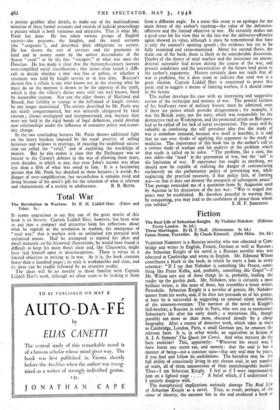Total War
The Revolution in Warfare. By B. H. Liddell Hart. (Faber and Faber. 55.)
IT seems ungracious to say that one of the great merits of this book is its brevity. Captain Liddell Hart, however, has been wise to put into a compact and attractive form his reflections about what he regards as the revolution in warfare, the emergence of " total war," that is warfare with an unlimited aim pursued with unlimited means. Had he attempted to expand his ideas and dwell minutely on his historical illustrations, he would have found it difficult to keep his main thesis clear and, like Clausewitz, might have laid himself open to misconceptions. There is virtue in a limited objective in writing as in war. As it is, the book contains fewer than a hundred pages ; its style is workmanlike and clear, and its ideas can be readily followed by an attentive reader.
The ideas will be no novelty to those familiar with Captain Liddell Hart's work, although we often seem to be locking at them from a different angle. In a sense this essay is an apologia for the main theses of the author's teaching—the value of the defensive- offensive and the limited objective in war. He certainly makes out a good case for his view that in the late war the defensive-offensive again showed its value, although it must be remembered that here is only the counsel's opening speech ; the evidence has yet to be fully examined and cross-examined. About his second thesis, the main one of the book, there is likely to be considerable discussion.
Doubts of the theory of total warfare and the insistence on uncon- ditional surrender had arisen during the course of the war, and present conditions and the uncertainties of the future lend point to the author's arguments. History certainly does not teach that all war is profitless, but it does seem to indicate that total war is a great illusion. Captain Liddell Hart is concerned to prove this point and to suggest a means of limiting warfare, if it should come in the future.
The author develops his case with an interesting and suggestive review of the technique and manner of war. The general fairness of his bird's-eye view of military history must be admitted, even if there are points which provoke disagreement ; for example, it was the British army, not the navy, which was responsible for the destructive raid on Washington, and the projected attack on Baltimore had to be called off for lack of naval co-operation. The essay will be valuable in combating the still prevalent idea that the study of war is somehow immoral, because wit itself is horrible; it is odd that no one ever thinks of applying this argument to the study of medicine. The importance of this book lies in the author's call to a serious study of warfare and his analysis of the problem which that study is called on to solve. " The problem, like a coin, has two sides—the ' head' is the prevention of war, but the ' tail' is the limitation of war. If experience has taught us anything, we should now_ be capable of realising the danger of concentrating exclusively on the perfectionist policy of preventing war, while neglecting the practical necessity, if that policy fails, of limiting war—so that it does not destroy the prospects of subsequent peace." That passage reminded me of a quotation from St. Augustine used by Aquinas in his discussion of the just war: "War is waged that peace may be established. Be therefore peaceful in warring that, by conquering, you may lead to the usefulness of peace those whom






























 Previous page
Previous page